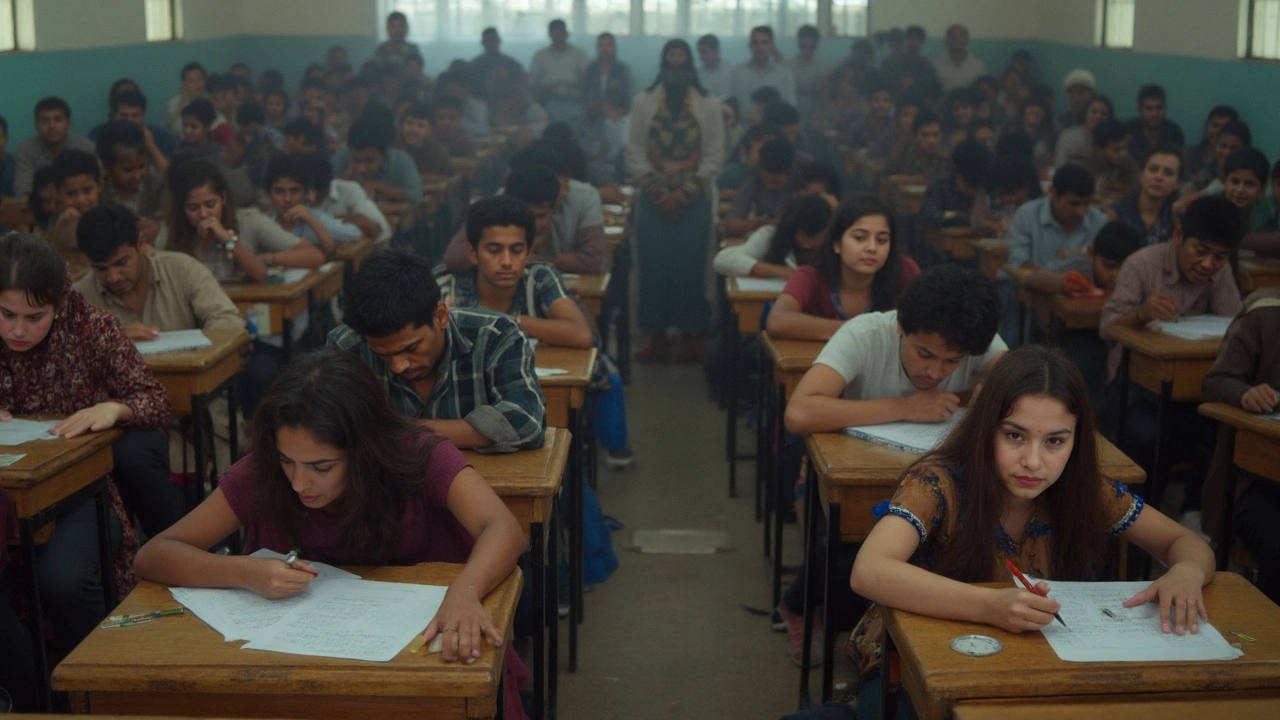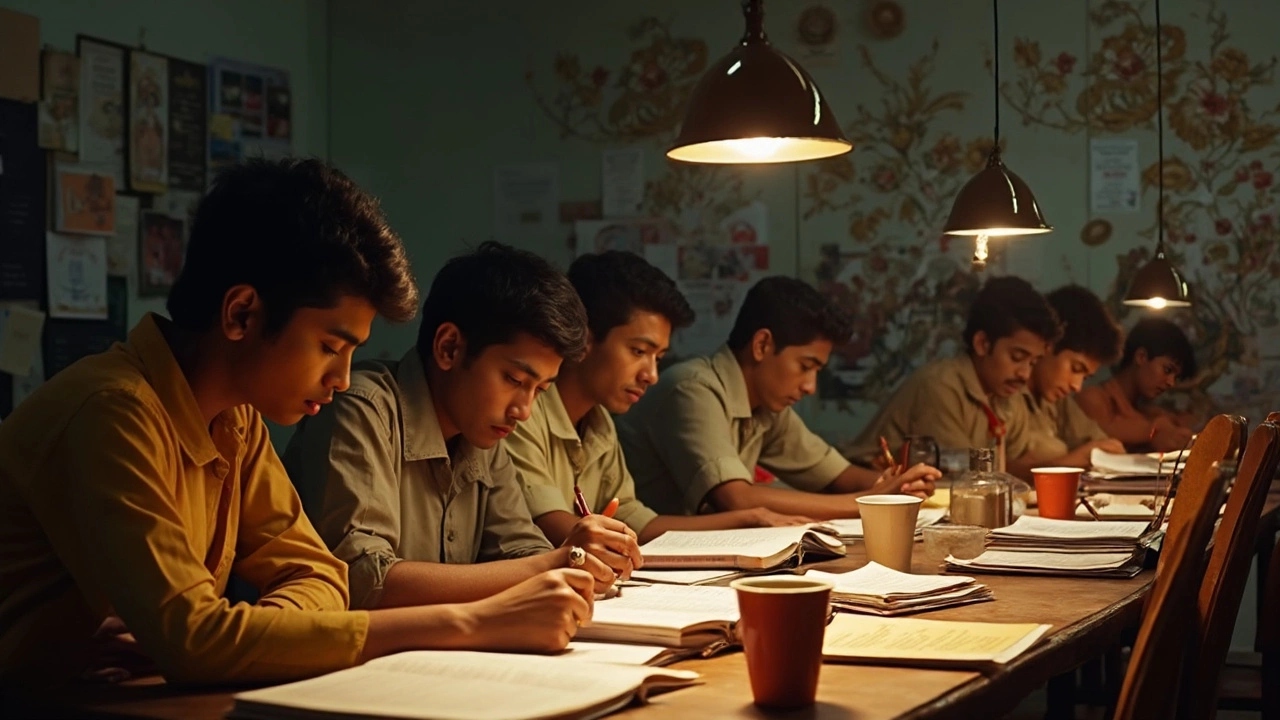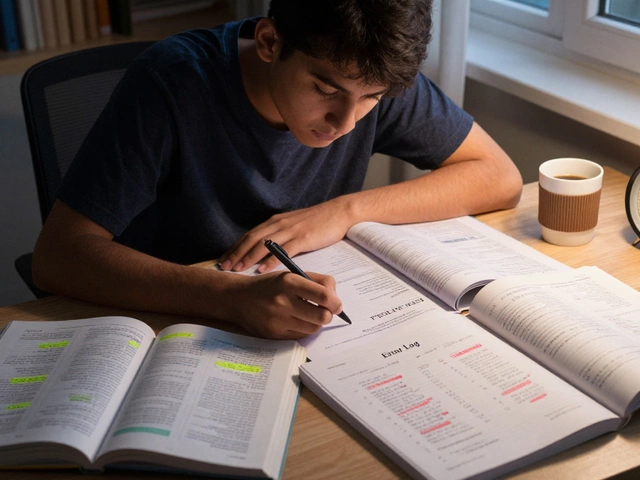You ever wonder which class in America students dread the most? It’s not just about piles of homework. The real monsters are the classes where you prep for a single do-or-die exam—classes that could decide your entire future. Some kids break out in a cold sweat just walking into AP Physics C. Future doctors lose sleep over MCAT prep. Plenty of smart folks have nightmares about Bar Exam boot camps. So, which one actually deserves to be called the hardest?
Here’s the secret: it’s not only about super tricky content. It’s the nonstop grind, insane pressure, and knowing thousands of others are up against the same mountain. If you’re thinking about taking any of these, you should know what you’re really up against. I’ll break down what makes these classes so rough, why some people survive, and the hacks that’ll help you outsmart the system. Ready to check out what you’re really signing up for?
- What Makes a Class 'the Hardest'?
- A Tour of America's Toughest Exam Prep Courses
- AP Physics C: The High School Beast
- MCAT Prep: The Med School Gatekeeper
- Bar Exam Review: The Legal Nightmare
- Tips to Survive—and Maybe Even Succeed
What Makes a Class 'the Hardest'?
Everyone has an opinion about what counts as the hardest class, but a few things show up over and over. First is the workload. These classes dump mountains of readings, tough problem sets, and never-ending practice tests on you. But it’s not just about volume—it’s the complexity. You’re not memorizing facts; you’re learning how to think and solve new types of problems under pressure.
Then you’ve got the competition. In classes prepping for competitive exams like the MCAT, Bar Exam, or certain AP courses, everyone wants to be the best. That vibe ramps up the stress and makes it harder to keep up. Slip for even one week and you could fall behind for good.
High stakes are also a huge part of what makes these courses brutal. Failing the AP Physics C exam can block you from top colleges. Bombing the MCAT could mean waiting another year for med school—and that’s if you get in at all. It’s the same thing with the Bar: miss the mark, and you’re locked out of your whole career until the next round.
Here’s a peek at some factors that make a class land on the “hardest” list:
- Relentless workload—weeks where you barely sleep
- Super tough or unfamiliar concepts (think quantum physics or legal arguments)
- No second chances: one-shot, huge-exam finals
- Peer pressure and serious competition
- Loads of mental burnout and anxiety
If you look at averages, these courses usually have pretty low pass rates or high drop-out rates. Check this out:
| Class/Exam | National Pass Rate (2024) |
|---|---|
| AP Physics C | 55% |
| MCAT | 45% (for scores above med school cutoffs) |
| Bar Exam | 64% |
So when people talk about the hardest class in America, they usually mean the one that crunches all these things into a single, non-stop grind. It’s not just about memorizing—it’s about keeping your cool, managing your time, and staying on top of a game that feels rigged from the start.
A Tour of America's Toughest Exam Prep Courses
If you look up the hardest class in the U.S., you’ll see all sorts of contenders, but classes prepping for big-league competitive exams are in a league of their own. It’s not just tough content—they stack on time pressure and insane expectations. Every year, thousands of students pay top dollar and devote months (sometimes years) to these classes, just for a shot at a passing score. What are the major beasts?
- AP Exams (like AP Physics C, AP Calculus BC): High schoolers sign up hoping to bag college credit and boost their GPAs. Passing means more than bragging rights—it can save you tuition money and time in college. The College Board says that about 60% of testers score a 3 or better, but some APs (like Physics C: E&M) see fewer than 35% getting a 5.
- MCAT Prep Courses: For future doctors, this is non-negotiable. The MCAT covers biology, chemistry, physics, psychology, and reading analysis. A top MCAT prep class can cost over $2,000 and many students log more than 300 study hours. According to the AAMC, the average MCAT score for med school acceptance is 511—no joke when the max is 528.
- Bar Exam Prep: Law school grads know the grind. Bar review classes like BARBRI and Themis are practically mandatory and students regularly clock 400+ hours of hard-core study. Despite that, stats from the National Conference of Bar Examiners show about 21% still fail on their first try.
- CPA Review: Garbage in, garbage out. If you want to be an accountant, four sections stand between you and your credential. Only about 50% pass all parts on their first attempt, says the AICPA.
Each of these courses chews up your time, drains your focus, and makes your social life disappear. Peter Cote, a bar prep instructor, tells it like it is:
“It’s not just about knowing the answer. It’s about figuring out the test—and doing it faster and better than the thousand other people fighting for the same seat.”
Money is another factor. Some prep courses cost thousands, not counting registration fees for the actual test. Take a look at this cost breakdown:
| Exam | Average Prep Class Cost | Hours Recommended for Prep |
|---|---|---|
| AP Exams | $400-800 | 100+ |
| MCAT | $2,000-3,500 | 300+ |
| Bar Exam | $2,500-4,000 | 400+ |
| CPA Exam | $2,000-3,000 | 200+ |
There’s no magic bullet—just a lot of sweat and a game plan. Whether you call it the hardest class or just a really rough ride, you’ll find out fast that these prep programs sort out who’s truly ready and who needs more time in the trenches.
AP Physics C: The High School Beast
This class isn’t just a tough elective—it’s the final boss of high school science. AP Physics C is split into two separate courses: Mechanics and Electricity & Magnetism. The thing that instantly makes it harder than most other high school classes is that it’s calculus-based. A lot of students taking it are still learning calculus at the same time, so you can imagine how wild the juggling act gets.
Just to keep it real, most students taking AP Physics C are aiming for STEM careers. The class ranks at the top for difficulty according to just about any high school exit survey. It's not just memorization—it’s nonstop problem-solving. Every single test question feels like a puzzle where you actually need to know why stuff works instead of just plugging numbers in a formula.
Here’s something that might make your jaw drop: less than 40% of AP Physics C test takers nationwide get the top score of 5 (for E&M, it’s often closer to 30%). And these are usually the brightest kids going up for top-tier engineering programs, so it’s not like the test is full of slackers.
| AP Physics C Exam | % Who Score 5 (2024 Data) |
|---|---|
| Mechanics | 38% |
| Electricity & Magnetism | 31% |
Another thing that makes AP Physics C brutal? Time. The exams are an hour and a half each, with multi-step free response questions that chew up every minute. If you freeze up on one problem, you risk tanking your score. The curve doesn’t offer much mercy because scores are already so high for students who make it to the finish line.
If you're thinking about signing up for this class, here are a few tips that real survivors swear by:
- Don’t skip the calculus basics. If you’re shaky on derivatives or integrals, get help early. Most of the hard stuff comes down to calculus tricks.
- Practice old free-response questions. The College Board posts decades of them—doing these will prep you better than any textbook can.
- Link concepts, don’t memorize. Understanding why one law leads to another speeds you up on test day.
- Use physics forums. Sites like Physics Stack Exchange or Reddit’s r/APStudents are goldmines for clarifying confusing problems.
If you can pull through AP Physics C, you’re more than ready for college-level engineering or physics classes. Surviving this beast means you’ve got the grit for whatever comes next in STEM.

MCAT Prep: The Med School Gatekeeper
If you ask students gunning for med school about the hardest class out there, most of them don’t hesitate—they’ll say the course that preps you for the MCAT. The Medical College Admission Test isn’t just long (over 7 hours, can you believe that?), it’s brutal in scope. You need to know biology, chemistry, organic chemistry, biochemistry, physics, psychology, and even a bit of sociology and critical reading. And you’re tested on how you actually apply that knowledge, not just memorizing it.
MCAT prep often feels like a part-time job—sometimes a full-time one. Most people spend 3-6 months studying, clocking in 300 to 500 hours total. That’s before even thinking about all those content review books stacked on your desk, online question banks, and endless practice tests.
| MCAT Section | # of Questions | Time Allotted (mins) |
|---|---|---|
| Chem/Phys | 59 | 95 |
| Critical Analysis (CARS) | 53 | 90 |
| Bio/Biochem | 59 | 95 |
| Psyc/Soc | 59 | 95 |
Here’s what makes MCAT prep courses so tough. First, the sheer volume. It’s not just about memorizing info from a textbook; you need to see how it all connects. If you breeze through memorizing facts, you’ll still get blindsided if you don’t practice with the passage-based questions that twist things around. Second, there’s pressure to ace it—seriously, top med schools are looking for MCAT scores in the 515+ range (out of 528). The average MCAT score in 2024 hovered around 501, but the folks getting into med school usually land much higher.
The most effective MCAT prep courses don’t just throw content at you; they show you real testing strategies. That means focusing on:
- Timed practice passages (regularly—they matter more than just reading notes!)
- Active learning, like explaining concepts out loud or teaching a friend
- Understanding how to guess effectively—because running out of time is almost guaranteed
- Tweaking your schedule based on strengths and weak spots
One sneaky tip? Many students swear by doing all the official AAMC practice tests—they’re the closest thing to the real deal. If you can only do one thing, do those.
Between juggling science, time, and stress, MCAT prep is often the single most intense class future doctors face before med school. If you make it through, you’ve already proved you can handle the pressure—and that’s exactly what med schools want to see.
Bar Exam Review: The Legal Nightmare
If you ask any law student which course is the real beast, most will tell you the Bar Exam review is in a league of its own. Forget easy finals where you can cram the night before—this exam makes you rethink your life choices. Every summer, thousands of soon-to-be lawyers barricade themselves indoors, fueled by anxiety and way too much coffee, just to make it out the other side with a passing score.
Most Bar Exam review courses pack months of law classes into a brutal 8-10 week sprint. The sheer amount of material is no joke. You’re covering contracts, criminal law, torts, property, constitutional law—basically everything you learned in three years of law school, now at double-speed. There's not a lot of hand-holding either. Each session comes with endless practice essays, multiple-choice questions, and mock exams that chew up your weekends.
Here’s a snapshot to make it clearer:
| Section | Number of Questions/Essays | Time Allotted |
|---|---|---|
| Multistate Bar Exam (MBE) | 200 Multiple-Choice | 6 hours (split in 2 sessions) |
| Multistate Essay Exam (MEE) | 6 Essays | 3 hours |
| Multistate Performance Test (MPT) | 2 Tasks | 3 hours |
Besides the insane schedule, the biggest stress comes from the pass rates. They aren’t as friendly as you’d hope. For example, in 2024, the national average pass rate for first-time takers was 58%. That means nearly half the folks, even after law school and grueling Bar Exam review, don’t make the cut the first time around.
Surviving isn’t about memorizing facts. You have to spot legal issues, write logical arguments, and know the smallest exceptions. The time pressure is wild—you get just about 1.8 minutes per MBE question. So, you need strategy more than genius-level smarts.
If you’re prepping for the Bar, here are a few things that work:
- Use a solid commercial review course—BarBri and Themis are the biggest names.
- Stick to a daily study schedule. Don’t skip days or you’ll fall behind fast.
- Drill practice questions; lots of people do thousands before the real thing.
- Review old essays and learn the model answers—spot the structure they want.
- Don’t go it alone—a study group or coach can keep you on track and sane.
Everyone dreads the Bar for a reason. It doesn’t just test your knowledge; it tests your endurance and sanity. If you pass, you earn serious bragging rights—and the freedom to actually practice law.
Tips to Survive—and Maybe Even Succeed
The grind for a hardest class like MCAT prep, Bar Exam review, or AP Physics C can burn you out quick if you’re not smart about it. Here’s some straight-talk advice on how to not just survive, but actually give yourself a shot at beating the odds.
- Make a Realistic Study Plan. Don’t try to cram. Create a calendar and break up topics into bite-sized chunks. For the MCAT, most students spend at least three months prepping, about 300 hours total. For the Bar Exam, think 400-600 hours over 2-3 months.
- Use Official Practice Exams. Every big exam has official practice questions. These aren’t just to gauge your knowledge—they teach you the exam’s style and tricks. People who take at least three full-length practice tests for the MCAT and Bar usually score a lot higher.
- Study in Groups (Sometimes). Team up for the brain-busters, especially for AP Physics C or tough MCAT content. But ditch group study if it turns into a chat fest or slows you down.
- Mix Up Your Methods. Use videos, flashcards, problem sets, podcasts, whatever sticks. Some folks ace the AP Physics free-response with Youtube explainers or old-school notes—what matters is switching it up so your brain doesn’t go numb.
- Don’t Ignore the Mental Side. Sleep. Seriously—7 hours or more. Study after a workout; you’ll remember better. If you hit major burnout, take a strategic day off. Students who take breaks score better, according to the Princeton Review.
Here’s a quick look at average prep time that most people actually need to clear these monsters:
| Exam | Average Prep Time |
|---|---|
| MCAT | 300-350 hours |
| Bar Exam | 400-600 hours |
| AP Physics C | 60-100 hours |
Remember, barely anyone aces these exams with talent alone. The hustle matters more than being "naturally smart." Track your practice scores, adapt your plan, and treat the course like a marathon—because it is. You want the edge? It starts by just showing up, every single day.




